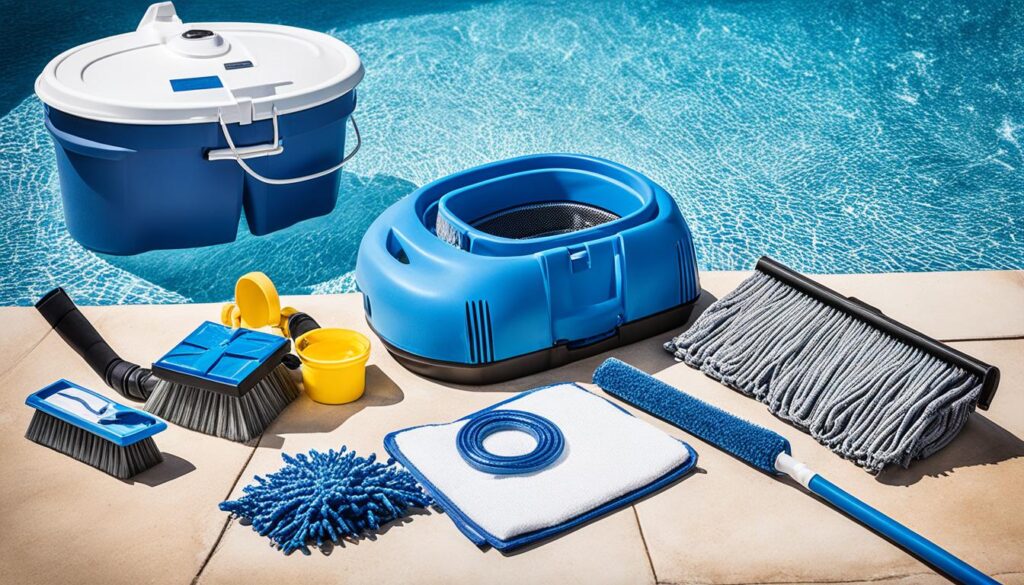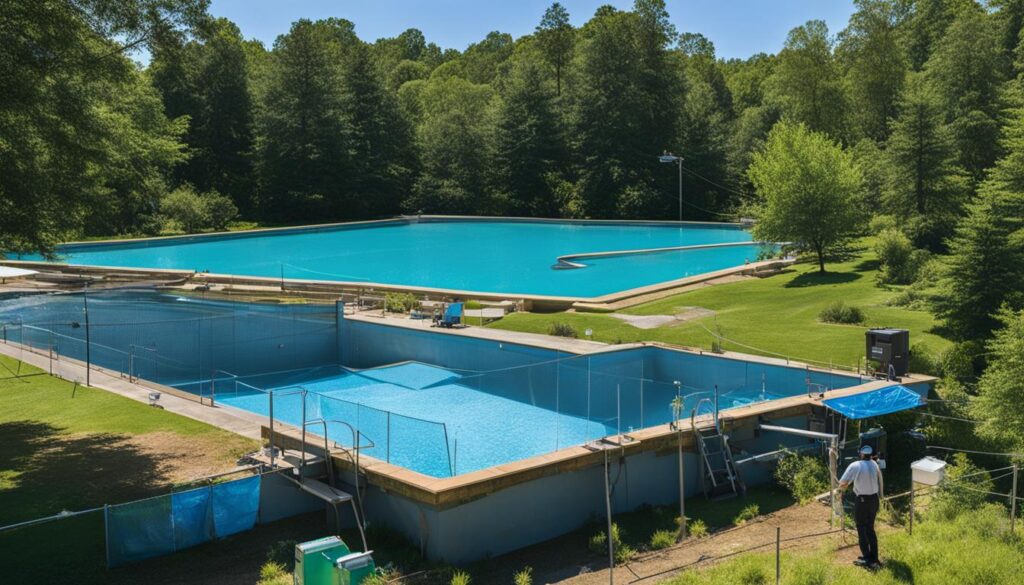Starting a pool cleaning business can be a lucrative opportunity in the United States. With the swimming pool cleaning service industry estimated at $8 billion, there is ample room for growth and profitability. If you are considering entering this industry, it is important to understand the essential steps to establish a successful pool cleaning business.
A pool cleaning business is responsible for maintaining the cleanliness and functionality of swimming pools. From checking and adjusting water chemical levels to inspecting and repairing pool equipment, pool cleaners play a vital role in ensuring a safe and enjoyable swimming experience for pool owners.
Now let’s dive deeper into the essential steps to start a pool cleaning business:
Key Takeaways:
- Conduct thorough market research to understand the demand for pool cleaning services in your area.
- Create a comprehensive business plan outlining your goals, target market, and marketing strategies.
- Register your business with the appropriate state authorities and obtain the necessary licenses and permits.
- Get certified as a Certified Pool Operator (CPO) to showcase your expertise and professionalism.
- Secure insurance coverage to protect your business and clients.
By following these steps and embodying a commitment to exceptional service, you can establish a thriving pool cleaning business. Remember to prioritize customer satisfaction and seek opportunities to differentiate yourself from competitors. With proper planning and execution, your pool cleaning business can make a splash in the industry.
What is a Pool Cleaning Business?
A pool cleaning business is responsible for maintaining the cleanliness and functionality of swimming pools. Whether it’s a residential pool or a commercial facility, the primary goal of a pool cleaning business is to ensure that pools are safe, hygienic, and enjoyable for their users.
To achieve this, pool cleaners perform a range of tasks and services. One important aspect of their work involves checking and adjusting water chemical levels, including pH balance and chlorine levels. This ensures that the water is properly sanitized and safe for swimming. Pool cleaners also conduct regular inspections of pool equipment to identify any issues that may affect the pool’s functionality.
In addition to chemical maintenance and equipment inspections, pool cleaning businesses offer regular cleaning services to keep the pool free from debris, such as leaves, insects, and other foreign substances. This is typically done through the use of skimmers, brushes, and pool vacuums.
Furthermore, pool cleaners are knowledgeable about the pool cleaning process and are well-versed in maintaining water chemistry and troubleshooting common problems with pumps, filters, and other pool equipment. By staying up-to-date with the latest industry standards and best practices, pool cleaning businesses can provide efficient and effective services to their clients.
Overall, pool cleaning businesses play a crucial role in maintaining the cleanliness and integrity of swimming pools. Their expertise ensures that pool owners can enjoy their pools without worrying about water quality or equipment malfunctions.
Pool Cleaning Industry: Staying Ahead of the Game
The pool cleaning industry is a dynamic and growing sector. With more people investing in pools for their homes and businesses, the demand for pool cleaning services is on the rise. This presents both opportunities and challenges for pool cleaning businesses.
To stay competitive in the pool cleaning industry, businesses need to provide high-quality services that stand out from the competition. This includes offering reliable and prompt service, using eco-friendly and sustainable cleaning methods, and building strong relationships with suppliers for affordable pool cleaning products.
Additionally, establishing a strong online presence through a professional website and social media platforms can help pool cleaning businesses reach their target audience effectively. Online marketing strategies, such as search engine optimization (SEO) and pay-per-click advertising, can also be utilized to attract potential customers and generate leads.
By staying informed about industry trends and advancements, pool cleaning businesses can position themselves as industry leaders. Regularly attending industry conferences and workshops, joining professional associations, and networking with fellow pool cleaning experts can help businesses stay up to date and provide value-added services to their clients.

9 Steps to Start a Pool Cleaning Business
If you’re considering starting a pool cleaning business, there are several key steps you need to follow to ensure a successful launch. By following these 9 steps, you’ll be well on your way to building a thriving pool cleaning business.
- Conduct market research and create a business plan: Start by researching the pool cleaning industry in your area. Identify your target market, competition, and potential demand. Create a comprehensive business plan that outlines your goals, services, target customers, marketing strategies, and financial projections.
- Register your business with the state and obtain necessary licenses: Before you can start operating your pool cleaning business, you’ll need to register it with the appropriate state authorities and obtain any necessary licenses or permits. Check with your local government agencies to ensure you meet all legal requirements.
- Get certified as a Certified Pool Operator: Obtaining a Certified Pool Operator (CPO) certification is crucial for running a professional and reputable pool cleaning business. This certification ensures you have the knowledge and skills required to effectively maintain swimming pools.
- Secure insurance coverage for your business: Pool cleaning involves potential risks and liabilities. Protect your business and clients by obtaining the necessary insurance coverage, including general liability insurance and workers’ compensation insurance if you have employees.
- Purchase the necessary equipment and a suitable vehicle: Invest in high-quality pool cleaning equipment, such as nets, brushes, vacuums, and chemical testing kits. Additionally, consider purchasing a reliable vehicle to transport your equipment to different pool locations.
- Develop your brand and marketing strategy: Building a strong brand presence is essential for attracting customers. Create a compelling brand identity, including a memorable logo, website, and social media profiles. Develop a marketing strategy that includes online advertising, local networking, and referrals.
- Identify and target your ideal customers: Understand your target market and tailor your services to meet their specific needs. Identify both residential and commercial clients, and create service packages that cater to their preferences.
- Provide exceptional customer service to build a strong reputation: Delight your customers by offering exceptional customer service. Be responsive, reliable, and go above and beyond to ensure customer satisfaction. Positive word-of-mouth referrals are invaluable for growing your pool cleaning business.
- Optimize your routes and appointments with route planning software: As your business grows, efficiently scheduling and optimizing your routes becomes crucial. Utilize route planning software to minimize travel time between pool locations and maximize your productivity.

Following these 9 steps will set you on the path to starting a successful pool cleaning business. With proper planning, exceptional service, and a focus on customer satisfaction, your business has the potential to thrive in the lucrative pool cleaning industry.
Pros and Cons of a Pool Cleaning Business
Starting a pool cleaning business comes with its own set of pros and cons. Understanding the benefits and challenges can help you make an informed decision before diving into this venture.
Benefits of Starting a Pool Cleaning Business
- Low startup costs compared to other businesses allow for a more accessible entry into the industry.
- The high demand for pool cleaning services ensures a consistent flow of customers and potential for growth.
- The physical activity involved in cleaning pools provides an opportunity for exercise and staying active.
- You have the flexibility to choose your target market, whether it’s residential, commercial, or both.
Challenges of Starting a Pool Cleaning Business
- Fierce competition exists in the pool cleaning industry, so standing out and gaining market share can be challenging.
- Seasonal fluctuations in demand may require adjusting your business strategy to maintain steady revenue throughout the year.
- Continuous learning and staying updated with pool maintenance practices are essential to meet customer expectations and industry standards.
While there are challenges to navigate, the advantages of starting a pool cleaning business, such as low startup costs and a growing market, can outweigh them. By providing quality service, adapting to market demands, and continuously expanding your knowledge, you can turn your pool cleaning business into a successful and profitable venture.
Image:
What is the Cost of Launching a Pool Cleaning Business?
When starting a pool cleaning business, understanding the cost involved is crucial for planning and budgeting effectively. The expenses of launching a pool cleaning business can vary depending on several factors:
- Location: The cost of launching a pool cleaning business may differ based on the region or city where you operate. Factors such as local competition and the cost of living can impact expenses.
- Equipment Purchases: To effectively clean and maintain pools, you’ll need to invest in essential equipment such as pool skimmers, vacuum cleaners, water testing kits, and chemicals. These initial equipment purchases contribute to the startup costs.
- Licensing Fees: Depending on your local regulations, you may need to obtain specific licenses or certifications to operate a pool cleaning business legally. These licensing fees may vary, so it’s essential to research the requirements in your area.
- Marketing Expenses: Promoting your pool cleaning business is vital to attract customers. Consider the cost of marketing materials, online advertising, website development, and other promotional strategies to reach your target audience.
- Insurance Coverage: It’s crucial to protect your pool cleaning business and mitigate potential risks. The cost of insurance coverage, including liability insurance and workers’ compensation insurance, should be factored into your budget.
The budget for a pool cleaning startup can range from a few thousand dollars to tens of thousands of dollars, depending on these factors. It’s essential to create a detailed budget that includes both one-time startup costs and ongoing monthly expenses. By accurately estimating the costs, you can develop a realistic financial plan and ensure your pool cleaning business has a solid foundation for success.
Conclusion
Starting a pool cleaning business can be a rewarding venture in the fast-growing swimming pool cleaning service industry. By following the necessary steps, providing exceptional service, and staying committed to customer satisfaction, you can position your business for success.
With the market size of the swimming pool cleaning service industry estimated at $8 billion, there is a significant demand for professional pool cleaning services in the United States. By offering high-quality and eco-friendly cleaning methods, and building strong relationships with retailers for affordable supplies, you can attract customers and establish a competitive edge in the market.
While it’s essential to be prepared for challenges such as fierce competition and seasonal fluctuations in demand, the potential for growth and profitability makes starting a pool cleaning business an attractive opportunity. By continuously learning and staying updated with the latest pool maintenance practices, you can provide top-notch services and build a strong reputation in the industry.
In conclusion, starting a pool cleaning business requires careful planning, dedication, and a commitment to excellence. By implementing effective marketing strategies, providing exceptional customer service, and staying up-to-date with industry trends, you can create a successful pool cleaning business. Remember, with the right approach, determination, and passion for serving your customers, your pool cleaning business can thrive and become a profitable venture in the lucrative swimming pool cleaning service industry.
FAQ
What are the steps to start a pool cleaning business?
Conduct market research and create a business plan, register your business with the state and obtain necessary licenses, get certified as a Certified Pool Operator, secure insurance coverage for your business, purchase the necessary equipment and a suitable vehicle, develop your brand and marketing strategy, identify and target your ideal customers, provide exceptional customer service to build a strong reputation, and optimize your routes and appointments with route planning software.
What is a pool cleaning business?
A pool cleaning business is responsible for maintaining the cleanliness and functionality of swimming pools. This includes tasks such as checking and adjusting water chemical levels, inspecting and repairing pool equipment, and offering regular cleaning services.
What are the pros and cons of a pool cleaning business?
Some advantages of starting a pool cleaning business include low startup costs compared to other businesses, high demand for services, the opportunity for physical activity, and the ability to choose your target market. However, challenges to consider include fierce competition, seasonal fluctuations in demand, and the need for continuous learning and staying updated with pool maintenance practices.
What is the cost of launching a pool cleaning business?
The cost of launching a pool cleaning business can vary depending on factors such as location, equipment purchases, licensing fees, marketing expenses, and insurance coverage. On average, the initial investment can range from a few thousand dollars to tens of thousands of dollars.




